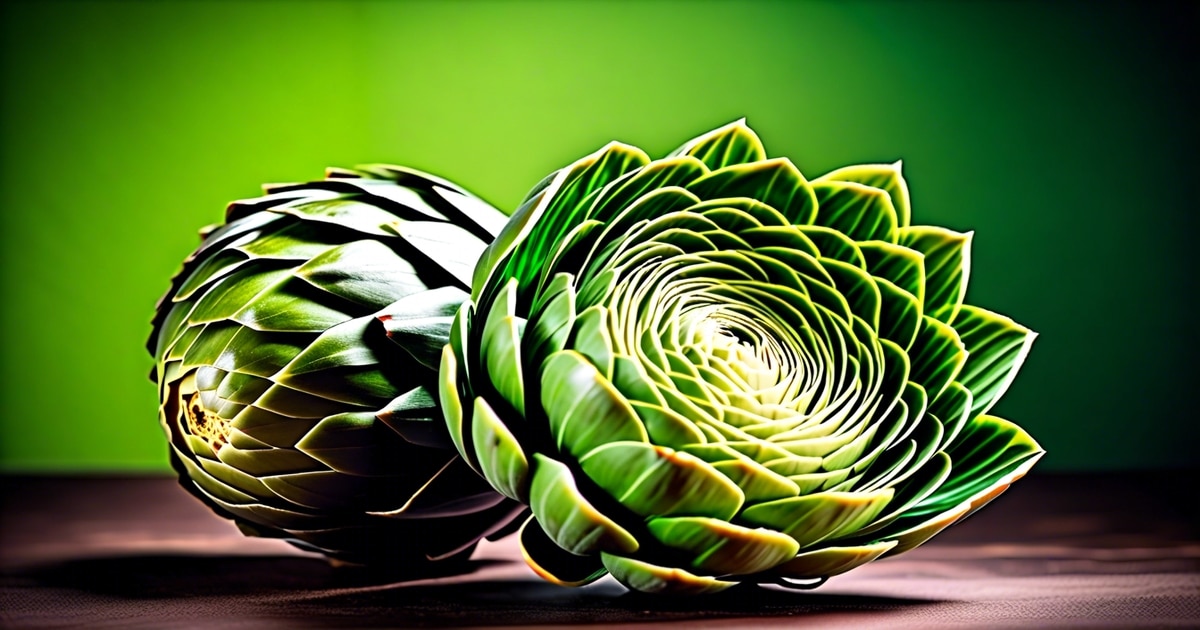Key Takeaways
- Incorporate artichokes into your diet to support liver health due to their rich nutritional profile, including antioxidants and fiber.
- Artichokes and vegetables can help improve liver function by aiding in detoxification and protecting liver cells from damage.
- Consider using artichoke leaf extract as a natural remedy to reduce liver enzyme levels and promote overall liver health.
- Lower your cholesterol levels by consuming artichokes regularly, which can contribute to a healthier liver and cardiovascular system.
- The anticancer properties found in artichokes may offer additional protection for the liver against harmful cells and promote overall well-being.
- When preparing artichokes, opt for cooking methods that retain the most nutrients to maximize the liver health benefits they provide.
- Read on to discover: is artichoke good for your liver?
Nutritional Profile of Artichokes
Benefits of Artichokes for Liver Health
Artichokes are a nutrient-rich vegetable that can benefit your liver health. The high fiber content in artichokes aids digestion, helping the liver function optimally. Fiber also promotes satiety, which can prevent overeating and support weight management. Consuming artichokes provides essential vitamins and minerals crucial for liver health. Nutrients like vitamin C act as antioxidants, protecting the liver from damage caused by free radicals. Vitamin K supports blood clotting, which is vital for overall liver function. In addition to vitamins, artichokes contain folate and potassium, further supporting liver health. Folate helps break down homocysteine levels in the blood, reducing stress on the cardiovascular system and indirectly benefiting the liver.- The high fiber content aids digestion.
- Rich in antioxidants like vitamin C
- Contains folate and potassium, beneficial for overall liver function
Health Benefits of Artichokes for Liver Health
Promotes Bile Production
Artichokes are good for your liver because they promote bile production. Bile helps digest fats efficiently, making it easier for your body to absorb essential nutrients. This process supports overall liver function and health. Artichokes support the liver by aiding in the digestion and absorption of fats through promoting bile production.- Efficient digestion of fats
- Enhanced nutrient absorption
Protects Against Free Radicals
The antioxidants found in artichokes play a crucial role in protecting the liver from damage caused by free radicals. These harmful molecules can harm liver cells, but with the help of antioxidants from artichokes, this damage can be minimized, promoting better liver health.Artichoke Leaf Extract and Liver Enzymes

Improving Liver Enzymes
Artichoke leaf extract has been linked to enhancing liver enzyme levels, particularly in individuals with liver disease. The active compounds found in artichoke leaves possess hepatoprotective properties that support the liver’s overall function. Studies have indicated that regular intake of artichoke leaf extract can play a role in maintaining healthy levels of liver enzymes over time. Consuming artichoke leaf extract may be beneficial for those dealing with conditions like fatty liver disease or alcoholic fatty liver disease. The antioxidants present in artichokes are believed to aid in protecting the liver and minimizing damage caused by various factors. Research conducted on cultured rat hepatocytes has shown promising results regarding using artichoke leaf extract as a supportive treatment for improving liver health.- Pros:
- Enhances liver enzyme levels
- Supports overall liver function
- It contains antioxidants beneficial for the liver
Managing Cholesterol with Artichokes
Lowering Cholesterol Levels
Artichokes are beneficial for managing cholesterol levels as they contain compounds that can inhibit the production of cholesterol in the liver. By including artichokes in your diet, you may experience a reduction in LDL (“bad”) cholesterol levels. These effects have been observed in studies focusing on high cholesterol and randomized controlled trials.- Artichoke compounds inhibit the liver’s cholesterol production.
- Helps reduce LDL (“bad”) cholesterol levels
Fiber Content Benefits
The fiber content present in artichokes plays a crucial role in improving cholesterol management. Fiber helps lower total cholesterol levels, contributing to overall heart health by reducing the risk of heart disease.Anticancer Properties of Artichokes for Liver
Anticancer Properties
Artichokes contain compounds with anticancer properties that may benefit liver health. The antioxidants in artichokes can help combat oxidative stress, a known risk factor for cancer development. Research suggests that these properties could potentially aid in preventing liver cancer. Researchers have linked Artichokes’ properties to potential benefits in liver cancer prevention. These findings indicate promising results regarding the role of artichokes in maintaining liver health. Although further studies are necessary to confirm these effects, initial research shows encouraging signs.- Antioxidants combat oxidative stress.
- Compounds exhibit anticancer properties.
- Potential role in preventing liver cancer
Promising Results
Preliminary research highlights the positive impact of artichokes on liver health, particularly in terms of potential anticancer effects. Incorporating artichokes into your diet can support your overall well-being and maintain a healthy liver function. Incorporating artichoke into your diet can offer various health benefits, such as supporting antioxidant defenses and potentially aiding in preventing certain types of cancers like liver cancer.Preparing Artichokes for Maximum Liver Health Benefits
Retaining Nutritional Value
Steaming or boiling artichokes is beneficial for liver health as it helps preserve their nutrients. Cooking them this way ensures that the liver-protective compounds are not lost in the process. Pairing artichokes with healthy fats like olive oil can further enhance the absorption of these beneficial compounds. Artichokes offer a range of benefits. Regularly consuming prepared artichokes can support your liver’s function and overall well-being. It’s crucial to avoid overcooking them because doing so may diminish their nutritional content and ultimately reduce their effectiveness in promoting liver health.Maximizing Health Benefits
When preparing artichokes, focus on techniques that help retain their nutrients intact, ensuring maximum benefit for your liver. Opt for gentle cooking methods like steaming or boiling rather than frying or heavy sauces, which might negate some positive effects on your liver.- Pros:
- Retains nutrients
- Enhances absorption with healthy fats
Risks and Side Effects of Artichoke Supplementation

Digestive Issues
While beneficial for liver health, artichokes can sometimes cause digestive issues like gas or bloating. These symptoms are usually mild and temporary. If you experience discomfort after consuming artichokes, it might be due to their high fiber content. Artichoke supplementation is generally safe for most people; however, individuals with existing gallbladder or bile duct disorders should exercise caution. Before incorporating artichoke extract into your diet, please consult a healthcare professional to ensure it won’t exacerbate any underlying conditions you may have.Allergic Reactions
Although rare, allergic reactions to artichokes are possible. If you notice adverse symptoms such as itching, swelling, or difficulty breathing after consuming artichokes or supplements containing artichoke extract, seek immediate medical attention. Paying attention to how your body reacts to new foods or supplements is essential.- Pros:
- Supports liver health
- High in antioxidants
Choosing an Artichoke Extract Product
Standardized Products
When selecting an artichoke extract product, opt for those that are standardized. These products contain specific active compounds like cynarin found in artichoke, ensuring you get the intended benefits from the supplement. Could you look for labels indicating standardization to ensure potency? Please look over third-party testing when choosing an artichoke extract product. Third-party testing ensures that the product has been evaluated by an independent organization for quality and purity. This step is crucial in verifying the authenticity and effectiveness of the supplement.Seeking Professional Guidance
It’s best for you to consult a healthcare professional before purchasing any artichoke extract product. Healthcare providers can offer valuable insights into which product might best suit your needs based on your health condition or goals. They can provide personalized recommendations tailored to optimize your liver health.Summary
So, there you have it—artichokes pack a powerful punch. Artichokes are a liver’s best friend, from aiding in managing cholesterol to potentially fighting cancer cells. Remember, incorporating artichokes into your diet doesn’t have to be a daunting task. Whether steamed, roasted, or blended into a tasty artichoke dip, there are plenty of ways to reap the benefits of this liver-loving food. Now that you know artichokes’ incredible benefits for your liver, why not head to the store and grab some? Your liver will thank you! Make your next meal not just delicious but also a boost for your liver health with artichoke. Go on, give those artichokes a try!Frequently Asked Questions
Is artichoke beneficial for liver health?
Artichokes contain compounds that support liver function, such as cynarin and silymarin. These components help protect the liver cells and promote detoxification processes, making artichokes beneficial for overall liver health.Can artichokes help in managing cholesterol levels?
Yes, artichokes can aid in managing cholesterol levels due to their high fiber content and antioxidants. The fiber helps reduce bad cholesterol (LDL) levels while the antioxidants combat oxidative stress, contributing to a healthier lipid profile.Does Artichoke Extract Have Any Health Benefits Beyond Liver Health?
Yes, artichoke extract has top health benefits beyond just liver health. This natural supplement is known for reducing cholesterol levels, aiding in digestion, and promoting overall heart health. Additionally, artichoke extract can also support weight management and improve skin health.

